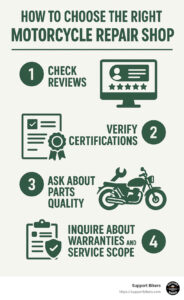Having your car break down is already stressful enough, but finding a reliable mechanic can be an even bigger challenge. A survey by AAA revealed that one-third of motorists in the U.S. are unequipped to navigate this part of car maintenance. Such numbers highlight the importance of comparing local experts to find the best service for your vehicle.
Understanding the history and reputation of local mechanics can save you from expensive and unnecessary repairs. Many local car mechanics build their businesses on trust and quality service, as customer loyalty plays a significant role in their success. In fact, a Consumer Reports study emphasizes that customers are three times more likely to return to an independently owned shop that has been vetted and recommended by others. This reinforces the value of investing time in comparing local experts for car maintenance or repair needs.

Evaluating Car Mechanics Near You: What to Look For
When evaluating car mechanics in your area, credibility and proper certification are critical factors. Mechanic certifications from organizations like ASE (Automotive Service Excellence) ensure that the professionals have the necessary training. Certification also implies a commitment to staying updated with the latest car repair techniques. This can give you peace of mind knowing your vehicle is in competent hands. Choosing certified mechanics can help you avoid unnecessary repairs.
Another important aspect to consider is the range of services offered. A good local mechanic should handle everything from routine maintenance to complex repairs. This can save you the hassle of having to visit multiple shops. A comprehensive range of services indicates that the mechanic is well-versed in various aspects of car care. Be sure to ask about their specific areas of expertise.
Pricing transparency is also crucial when selecting a mechanic. Transparent pricing means you’ll know exactly what you’re paying for without hidden fees. Request a detailed quote before any work begins. Compare this quote with other local mechanics to ensure it’s competitive. Clear pricing policies build trust and ensure you receive fair service.
Customer reviews and testimonials provide valuable insight into the quality of service. Reading reviews can reveal common experiences other customers have had. Pay attention to patterns in feedback, whether positive or negative. A mechanic with numerous positive reviews likely offers reliable service. Trustworthy testimonials can guide you toward the best local expert.
Credibility and Certification of Mechanics
Credibility is key when choosing a mechanic. One of the best ways to judge credibility is through certifications. Certifications like ASE (Automotive Service Excellence) show that the mechanic has met high standards in education and skills. This ensures they are well-equipped to handle various repairs. Such credentials also demonstrate a commitment to their craft.
Different types of certifications focus on various aspects of car repair. For example, some mechanics earn certifications in specific areas like brakes, engines, or electrical systems. These specialized credentials can be particularly valuable if your vehicle has specific issues. Always ask to see these certifications. It’s a simple step that can save you from potential headaches.
Mechanic shops that display these certifications often provide better service. They tend to keep up with industry changes and technological advancements. This means they are more likely to use modern techniques and tools. It also implies a focus on continuous improvement. Such dedication generally leads to higher customer satisfaction.
Besides certifications, check for membership in reputable automotive organizations. Memberships in groups like AAA or the Better Business Bureau add another layer of credibility. These affiliations usually mean the mechanic adheres to higher standards. Such memberships also often include customer protection policies. All these elements together can help you make a more informed decision.
Range of Services Offered
When selecting a car mechanic, the range of services they offer is crucial. A comprehensive service list indicates that the mechanic shop can handle various issues. This eliminates the need to visit multiple places for different problems. Some mechanics specialize in specific areas, while others offer broader services. Having all services in one place saves time and hassle.
Common services provided by reputable mechanics include oil changes, brake repairs, and engine diagnostics. More advanced services may include transmission repairs and electrical system troubleshooting. Additionally, some shops offer tire services and alignment checks. A well-rounded service menu ensures your car gets complete care. This can prolong the life of your vehicle.
Some mechanics also offer specialized services. These may cater to specific vehicle makes, such as German or Japanese cars. It’s beneficial to choose a mechanic familiar with your car brand. Specialized knowledge can lead to quicker, more effective repairs. This type of expertise is especially valuable for high-performance or luxury vehicles.
Customer convenience is also an important factor. Services like free inspections or vehicle pickup and drop-off can make life easier. Some shops offer online appointment scheduling to save you time. Additional conveniences can enhance your overall experience. Consider these aspects when comparing local mechanics.
Pricing Transparency and Competitiveness
Pricing transparency is a key factor when choosing a mechanic. Clear and upfront pricing helps you avoid unexpected costs. Reputable mechanics usually provide detailed estimates before starting any work. These estimates should itemize parts and labor costs. This level of detail builds trust and helps you stay within budget.
Competitive pricing is another essential aspect to consider. Compare estimates from different mechanics to ensure you’re getting a fair deal. Sometimes, a lower price can mean lower quality parts or service. However, high prices don’t always guarantee better service. Look for a balance between cost and quality.
Some mechanics might offer discounts or special promotions. Keep an eye out for these deals, as they can make repairs more affordable. Loyalty programs or repeat customer discounts can also benefit you. Always ask about available promotions when getting your estimates.
Online reviews can provide insights into pricing practices. Customers often mention whether they felt they received good value for their money. Reading several reviews can help you gauge the mechanic’s pricing transparency. This feedback is valuable for making an informed choice.
Mechanic shops that prioritize transparency typically list their pricing online. Some even offer price comparison tools on their websites. These tools allow you to estimate potential costs before visiting the shop. Having pricing information online adds an extra layer of convenience for customers.
Service warranties also play a role in pricing competitiveness. Shops offering warranties on parts and labor provide added value for their services. Warranties can protect you from future costs if an issue arises. Always ask about the warranty terms when discussing pricing. This ensures you get the best overall value.
Customer Reviews and Testimonials
Customer reviews and testimonials are valuable resources when selecting a mechanic. They provide firsthand accounts of other people’s experiences. Reading these can help you gauge the mechanic’s reliability and service quality. Positive reviews can reassure you about your decision. Conversely, negative reviews can serve as red flags.
Many review platforms like Google, Yelp, and Facebook offer a mix of reviews. This variety allows for a broader understanding of the mechanics’ reputation. Pay attention to recurring themes in the reviews. If multiple customers mention the same issue, it’s something to consider. Consistency in feedback is more telling than isolated complaints.
Testimonials often highlight specific strengths of a mechanic. These could include punctuality, expertise, or customer service. Honest testimonials can provide insights into how a mechanic resolves issues. They can help you understand the overall customer experience. Consider testimonials as a complement to detailed reviews.
Some mechanics display customer testimonials on their websites. This can indicate their pride in their services. Verified testimonials add credibility to their claims. They often feature detailed accounts of customer satisfaction. Websites with these testimonials can be more trustworthy.
Platforms that verify reviews can offer more reliable insights. Verified reviews mean the customer had an actual transaction with the mechanic. This reduces the risk of fake or biased reviews. Look for mechanics with a high percentage of verified reviews. This adds an extra layer of trust.
Sometimes, mechanics respond to reviews and testimonials. Their responses can show how they handle criticism and value customer feedback. A professional and courteous reply is a good sign. It indicates that the mechanic values customer opinions and strives to improve. This level of engagement can enhance your confidence in their services.
Proximity and Accessibility
Proximity to a mechanic shop is a crucial factor. It simplifies scheduling regular maintenance and repairs. A nearby shop ensures you spend less time traveling for service. This can be especially important in emergencies. Convenience in location can greatly enhance your overall experience.
Accessibility also involves the shop’s hours of operation. Extended hours and weekend availability are huge benefits. They allow customers to visit without having to take time off work. Some mechanics even offer 24-hour services. These features provide flexibility to fit car maintenance into busy schedules.
Parking availability is another aspect of accessibility. A shop with ample parking makes drop-offs and pick-ups easier. Poor parking arrangements can add unnecessary stress to your visit. Look for shops that provide sufficient, convenient parking. This is a small detail but can make a big difference.
The ease of communication with the shop also matters. Mechanics who are easy to reach by phone or email provide better service. Quick responses to inquiries can prevent delays in repairs. Some shops offer online booking systems. These systems streamline the process of scheduling an appointment.
Accessibility isn’t just about physical location. Some mechanics offer mobile services, coming directly to you for basic repairs. This feature can save you a trip and add to your convenience. Check if your local mechanic provides such options. It’s a modern approach that enhances service flexibility.
Benefits of Choosing the Right Local Car Mechanic
Choosing the right local car mechanic offers numerous advantages. One major benefit is personalized service. Local mechanics often build close relationships with their customers, which enhances trust. You are more likely to receive honest advice and tailored recommendations for your vehicle. This personal touch can make all the difference in quality of service.
Another advantage is convenience. A nearby mechanic simplifies the logistics of scheduling repairs and maintenance. You can easily drop off your car, go about your day, and pick it up when it’s ready. This saves you time and reduces stress. Convenience plays a significant role in consistent vehicle upkeep.
Local mechanics usually offer competitive pricing compared to dealership services. Operating costs for smaller shops are typically lower, allowing them to pass savings onto you. Additionally, they might offer discounts or loyalty programs that stretch your budget further. Affordable prices without sacrificing quality are always a win.
Supporting local businesses also benefits your community’s economy. Money spent at local shops tends to stay within the community, fostering growth and development. By choosing a local mechanic, you’re contributing to this positive cycle. This support helps maintain a vibrant local business ecosystem.
Access to a range of emergency services is another perk of going local. Many local mechanics provide quick turnaround times for urgent repairs or flat tires. Their flexibility means you’re never stuck too long without your vehicle. Fast service during emergencies keeps you on the move.
Trust and reliability come naturally with established local mechanics who depend on repeat customers and word-of-mouth referrals for their livelihood.
Common Pitfalls When Selecting a Car Mechanic and How to Avoid Them
One common pitfall when selecting a car mechanic is choosing based on price alone. While saving money is important, the cheapest option can sometimes lead to subpar work. Low-cost services might use inferior parts or cut corners in repairs. Always ensure the mechanic uses quality parts and provides a fair estimate. Balancing cost with quality is key.
Another mistake is not checking certifications and credentials. Mechanics without proper training might lack the skills for complex repairs. Look for ASE certification or similar qualifications to ensure trustworthy service. Credentials indicate the mechanic has met industry standards. This adds an extra layer of confidence in their work.
Failing to read reviews or seek recommendations can also be a major error. Customer reviews and testimonials offer invaluable insights into the mechanic’s service quality. Ignoring this step might lead you to a shop with poor reputation and service. User experiences can highlight both strengths and weaknesses. Taking time to research will help you avoid bad experiences.
Not asking for a written estimate is another pitfall. Verbal estimates can lead to disputes over final costs. A written estimate itemizes parts and labor, providing transparency. It also serves as a reference in case of disagreements. Always request a detailed quote before proceeding with repairs.
Lack of communication can lead to misunderstandings and extra costs. Choose a mechanic who communicates clearly and regularly informs you about the status of your vehicle. Misunderstandings can occur if you aren’t updated on repairs or costs. Open lines of communication build trust. They ensure you’re on the same page with your mechanic.
Overlooking the location and accessibility of the shop can be inconvenient. A distant shop might make it hard to drop off or pick up your car, especially in emergencies. You’ll appreciate the convenience of a nearby, easily accessible mechanic. Consider both the quality and location when making your choice.
The Role of Technology in Modern Car Repairs and Maintenance
Technology plays a significant role in modern car repairs and maintenance. Diagnostic tools have revolutionized the way mechanics identify issues. These tools can quickly pinpoint problems that might take hours to find manually. Advanced diagnostics lead to faster and more accurate repairs. This efficiency saves both time and money for car owners.
Modern vehicles often come with complex computer systems. These systems control various functions, from engine performance to safety features. Mechanics use specialized software to interface with these systems. This technology allows for precise adjustments and troubleshooting. Accessing the right software is crucial for maintaining newer car models.
Another technological advancement is the use of high-tech equipment. For example, laser alignment machines ensure accurate wheel alignment. Precision tools like these contribute to better vehicle performance and longevity. Investing in the latest equipment helps mechanics deliver superior service. It also ensures that repairs meet manufacturer specifications.
Online platforms and apps have also transformed customer service in auto repair. Many garages now offer online booking and real-time updates on repair status. This convenience makes it easier for customers to manage their car maintenance schedules. Digital communication tools keep customers informed and engaged. These platforms streamline the overall repair process.
Electric and hybrid vehicles introduce new challenges and opportunities. Mechanics need special training and equipment to work on these advanced vehicles. Technology helps them stay updated with the latest repair techniques. Specialized knowledge ensures that these cars receive proper care. As electric and hybrid cars become more common, the role of technology will only grow.
Automation in repairs and maintenance is also becoming more prevalent. Machines can now handle tasks like tire changes and fluid checks. This automation speeds up routine services and reduces human error. The future of car repairs looks increasingly tech-driven. Embracing these changes can lead to enhanced service quality and customer satisfaction.
How to Build a Lasting Relationship with Your Mechanic
Building a strong relationship with your mechanic starts with trust. Consistently choosing the same mechanic helps them get to know your vehicle. They become familiar with its history and specific needs. This familiarity leads to more accurate diagnostics and better maintenance. Trust grows with each positive experience.
Clear communication is another key to a lasting relationship. Be open about your car’s issues and listen to their advice. Ask questions and seek clarification when needed. A transparent dialogue prevents misunderstandings and sets clear expectations. Good communication builds mutual respect and confidence.
Regular maintenance is critical in fostering this relationship. Schedule routine check-ups instead of waiting for emergencies. This proactive approach showcases your commitment to your car’s health. It also provides consistent business for your mechanic. Regular visits reinforce your reliability as a customer.
Showing appreciation goes a long way. Simple gestures like saying thank you or leaving positive reviews can make a big difference. Mechanics appreciate customers who recognize their hard work. Kind gestures foster a friendly and positive rapport. Such interactions contribute to a supportive relationship.
Providing honest feedback helps both you and your mechanic. If you’re satisfied with the service, let them know. If there’s room for improvement, offer constructive suggestions. Honest feedback helps mechanics enhance their services. It also ensures your needs are met more effectively.
Loyalty can lead to additional benefits. Long-term customers might receive perks like discounts or priority service. These benefits can make your car maintenance more cost-effective. Loyalty rewards also deepen the professional bond. A lasting relationship with your mechanic ultimately benefits both parties.

Conclusion
Choosing the right car mechanic involves several important factors. From evaluating their credibility to understanding the range of services offered, each aspect plays a role. Transparent pricing and positive customer reviews add to their trustworthiness. Proximity and the use of modern technology enhance convenience and service quality.
Building a lasting relationship with your mechanic benefits both you and the professional. Regular maintenance and clear communication ensure your vehicle stays in top shape. Trust and loyalty can even lead to cost savings and priority service. In the end, a reliable mechanic becomes a valuable partner in keeping your car running smoothly.





Leave a Reply